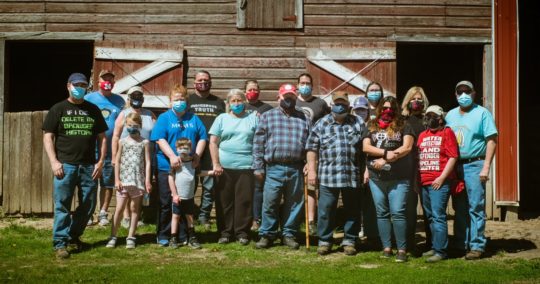As I drove to the pipeline hearing in Atkinson, I watched the farmers out in the field. I watched the birds perched on the prairie grass. I watched the rivers flowing under bridges. I watched the cattle sprawled across the hills. This is our state’s economic activity.
If Secretary Clinton signs a permit allowing TransCanada to build a pipeline carrying the dirtiest form of oil, we put 85% of Nebraskans’ clean water and 30% of our nation’s food supply at risk—becuase we all know, it is not if a leak happens, its when.
TransCanada is proposing to build a pipeline that will carry the dirtiest form of oil—tar sands—through our farmland, our Sandhills and our water. Leaks and spills happen with pipelines, that is a fact.
All of the things TransCanada says—the strength of the pipe, the lining, the detection measures—none of that matters because when oil spills into the Ogallala Aquifer, it will contaminate the groundwater supply that 85% of Nebraskans depend on.
The proposed pipeline, which will be the second one built in our state by TransCanada and Keystone, would transport tar sand oil right through the Ogallala Aquifer. Folks in Nebraska, as echoed in the LJS editorial, know the aquifer is one of the world’s largest bodies of clean water and provides 85% of Nebraskans clean drinking water and 30% of the nation’s water for irrigation of crops, which proudly earned this region the nickname, “America’s breadbasket.”
This past week, the US Department of State held a series of hearings to get public comments on one question—should Secretary Clinton sign a presidential permit allowing a pipeline to come across Nebraska and into Canada.
On the one hand, we are very lucky that the proposed pipeline is crossing our country’s border from Canada because if it wasn’t NO hearings would be taking place. Our state elected leaders failed us by not implementing state regulations that protects our land, water and economic activity from projects like this pipeline.
At the hearings in Fairbury, York and Atkinson, citizens stood up, went up to the microphone and clearly stated their concerns and opposition to the pipeline being built.
A mom pleaded and said “what we have isn’t just dirt and water, it is the heart and soul of the people who live here and it is the legacy we hope to pass down to our children and to our grandchildren.”
A landowner described the native prairie grass and wildlife on her land and how troubled she is just at the thought of that being torn up to lay the pipe.
A fourth generation rancher, Ben, is worried that the years his family spent ensuring their beef is certified organic will go out the window when a leak occurs, not to mention the obvious damage to the cattle, land and cost to his family ranch. One thing stuck out, he said “with our organic certification we can’t even put treated wood into the ground for fence, what will happen to our ranch when a leak happens?”
A young leader of an Alberta tribe drove for days to come to the hearing. He described how is aunt and grandmom are suffering from rare forms of cancer, his family lives near the processing plant in Canada—the source of the dirty oil that will be flowing through our state.
Yes, the pipeline will bring temporary jobs. Yes, the landowners will be compensated if the pipeline goes through their land.
Is that enough justification to put our water, land, health and economic activity at risk?
Here is what we don’t know:
When a leak happens, and all experts agree one eventually will, who will pay for the damage to that farmer or rancher’s long-term effects on their own health or the health of their crops or cattle? We are witnessing right now in the gulf fingers being pointed and no real answers.
When the pipe is out of use, who takes the pipe out or is it in the land forever?
How do we put a price tag on what the native prairie grassland costs since as experts will tell you, once you rip up the land, it is never the same.
Who will ensure the pipe is made from American steel and that the pipe is thick enough to sustain the almost million barrels of dirty oil that will flow through it every day?
Additionally, Section 526 of the Energy Independence And Security Act prohibits the United States government from buying oil produced by processes that produce more greenhouse gas emissions than traditional extraction, including oil sands. How do we know that the pipeline isn’t going to violate this law?
This is about dirty oil and money.
Elected officials do not run for office to hurt our state. As citizens, we assume when you lead our state and country, that you keep the safety of our families and the protection of our land and water in your mind at all times. This is one of those moments when Secretary Clinton, President Obama and Governor Heineman can show us they are leaders and put the brakes on this pipeline.
Sign the Petition, tell Secretary Clinton to NOT grant a permit to TransCanda, tell Gov. Heineman to put forth laws that protect our resources and economic activity and tell President Obama to live up to his promise of clean energy and energy independence.
Links for more info and action:
Nebraska petition to stop the pipeline



